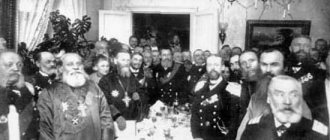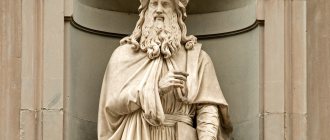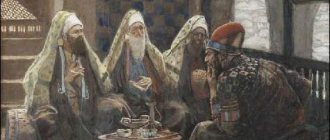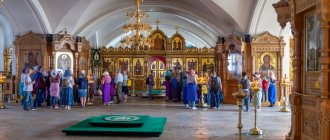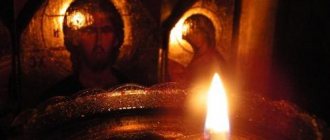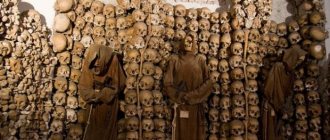Impressed by the biblical account of this terrible death, the famous Russian writer Anton Pavlovich Chekhov, who was also a doctor, tried to diagnose the Tsar using the method of “retrospective diagnosis.”
He was unable to establish exactly what disease the tyrant died from, but the circumstances of his death were truly terrible and became payment for all his sins.
The Bible says this about the death of the Jewish king Herod:
(Acts 12:20-25)
“And immediately the angel of the Lord struck Herod because he did not give glory to God: he died, eaten by worms.”
Herod the Great,
Also on topic:
ANCIENT PALESTINE
founder of the dynasty, born in southern Palestine in 73 BC. At this time, Judea enjoyed a semblance of independence under the rule of the Hasmonean dynasty, which came from the priestly line of the Maccabees, which led from 168–164 BC. successful uprising of the Jews against the king of Syria, Antiochus IV Epiphanes of the Greek Seleucid dynasty. Having captured southern Palestine, where the Edomites lived, the Hasmonean John Hyrcanus (reigned 134–104 BC) forced them to convert to Judaism. His son Alexander Jannaeus (103–76 BC) appointed the local aristocrat Antipater as governor of the entire area. Antipater's origins are unknown, but he was most likely born in Ascalon. His son, also named Antipater, was the father of Herod.
Antipater the Younger soon became an influential person at the court of Alexandra, Alexander's widow and the last ruler of the Hasmonean dynasty. By that time, the Hasmoneans had split into two camps. Antipater, guessing the inevitability of Roman intervention in the affairs of Palestine, decided for now to support the son of Alexander, Hyrcanus II (reigned 63–40 BC), the least powerful of the Hasmoneans competing with each other, and he hoped to come to an agreement with the Romans when they arrived . By taking a wife from Petra, a trading city in western Arabia, Antipater secured the support of the wealthy and influential Nabataean Arabs who lived east of the Jordan River. Thus, his children, although they professed Judaism, were Arabs on both their father and mother.
Also on topic:
HOLY ROMAN EMPIRE
In 63 BC, when Herod was 10 years old, Pompey the Great invaded Palestine and captured Jerusalem. Antipater provided significant assistance to the Romans, and in 47 BC. received Roman citizenship and became the de facto ruler of Judea (in particular, the troops were subordinate to him and he was in charge of collecting taxes). The indecisive Hyrcanus II was given the politically unimportant position of high priest. Herod, who was now 26 years old (he automatically became a Roman citizen after his father), was appointed ruler of Galilee. In 41 BC, two years after the death of Antipater (he was poisoned), Mark Antony, with whom Herod had been friends since his youth, made him tetrarch (king) of Galilee.
The following year, the Parthians invaded Palestine and internecine fighting began, forcing Herod to flee to Rome. The Senate appointed him king of Judea and provided him with an army. In 37 BC King Herod became the sole ruler of Judea and remained so for 32 years.
Also on topic:
ANCIENT ROME
During the decisive battle between Octavian and Antony for supremacy in Rome, Herod, despite Cleopatra's enmity towards him, supported Antony. After Antony's defeat in the naval battle of Actium in western Greece in 31 BC. Herod openly admitted that he had sided with the loser, and asked the victor, Octavian, to remember “not whose friend he was, but what a good friend he was.” Octavian, who was to become Emperor Augustus, retained Herod's kingdom and twice, in 22 and 20 BC, increased his possessions, so that Herod's kingdom included not only Palestine, but also parts of what is now Jordan east of the Jordan, as well as southern Lebanon and parts of Syria. Herod also became friends with the first minister of Augustus, Agrippa. Under Herod's harsh and energetic rule, Palestine prospered. Twice he managed to reduce taxes. When in 25 BC. drought led to severe famine, Herod took quick and effective measures to help the population.
Unfortunately, there was also a dark side to his character, expressed in pathological suspicion and bloodthirsty jealousy. As a young man he married Doris, with whom he had a son, Antipater. Having become king, Herod decided to divorce her and marry the Hasmonean princess Mariamne, the granddaughter of Hyrcanus II, famous for her beauty. By this he hoped to reconcile the Hasmoneans with himself, but his marriage only intensified the hostility. Mariamne's mother opposed him in every possible way, and Herod's sister Salome did the same (she should not be confused with the biblical Salome, who was his granddaughter). In the end, Herod exterminated almost the entire family - Mariamne’s grandfather, the elderly Hyrcanus II, her brother, who, at her insistence, was made high priest, but with his popularity aroused Herod’s suspicions. Mariamne herself died (in 27 BC), because Herod was forced to believe in her infidelity, and Mariamne’s cunning mother, and in the end, Herod’s sons from his marriage with Mariamne, Alexander and Aristobulus (in 7 BC), accused of plotting a coup.
Herod decorated Palestine with magnificent cities built in the Greek style, the most famous of which are Sebastia in ancient Samaria, which had fallen into disrepair by that time, and the port of Caesarea between Jaffa and Sikamin (modern Haifa). Herod also built a lot in Jerusalem. Most of all, his glory was brought to him by the complete reconstruction of the Temple. Huge, area approx. 15 hectares, the outer courtyard of the Temple has survived to this day, while not a trace remains of it itself. see also
TEMPLE.
Herod did not limit himself to decorating his own kingdom; he also gave gifts to many foreign cities, including Damascus, Antioch and even the island of Rhodes. The great king of Judah patronized the Olympic Games and even became their manager. It is impossible to deny that part of the reason for these benefits was the king's passion for ostentatious luxury, which he could not fully satisfy in Judea for fear of offending the Orthodox Jews. On the other hand, Herod acted as the patron of Jewish communities in neighboring countries and, for this purpose, did everything possible to please the pagans who dominated there.
In addition to Doris and Mariamne, Herod had eight more wives, six of whom had children. In total, Herod had fourteen children.
The last years of Herod's life were marred by mental and physical decline. In the course of suppressing the attempted rebellion, Herod became involved in a conflict with his eastern neighbors, a quarrel that brought him the displeasure of Augustus. Family relationships became more and more complicated. Herod changed his will three times and eventually disinherited and executed his first-born son Antipater. After a failed suicide attempt, Herod died in late March or early April 4 BC. The order given shortly before his death to kill the babies in Bethlehem fully confirms the state of complete degradation. Herod's last will stipulated that, with the permission of Augustus, the kingdom would be divided between three sons: Archelaus and Antipas, born to Herod by his sixth wife, the Samaritan Maltaca, and Philip, his son by Cleopatra of Jerusalem. Archelaus became king of Judea, and Antipas and Philip were to share their father's other possessions as tetrarchs.
Jesus Christ is one of those babies whom Herod ordered to be killed in Bethlehem
King Herod and Jesus never met, but the Bible tells of the Bethlehem massacre of the infants, one of whom was the baby Jesus. The Gospel of Matthew says that Herod learned from the wise men that the true King of the Jews had been born, and they were going to worship him (Matthew 2). However, the wise men did not tell the king where the baby was.
Massacre of the Innocents in the mosaic of the Roman Temple of Santa Maria Maggiore. King Herod ordered to kill all the firstborn in Bethlehem, because he was afraid that the “new king”, i.e. the Christ child will dethrone him
Herod was afraid because he did not come from the family of King David and a new contender for power could remove him from the throne. That is why he decided to kill the newborn king. Since Herod did not know where the baby was, he ordered the killing of all Bethlehem children under the age of two, hoping that the mysterious “future king” would be among them.
The Gospel says that infants were beaten, but the exact number of deaths is not reported. The Byzantine tradition speaks of 14,000, and the Syrian about 64,000.
14 000
babies were killed in Bethlehem by order of King Herod
Some scholars doubt the number of deaths, and they also say that the famous historian of Israel and Judea says nothing about this event.
To this, Father Alexander Men notes that the order to send a detachment of soldiers to Bethlehem with the order to kill all babies under two years old there was most likely given by Herod in deep secrecy. The Orthodox Church honors the saints of the 14 thousand infants of Bethlehem, killed by order of King Herod on January 11.
Antipas
was vile and cunning, Christ ( Luke
13:32) calls him “fox.”
After the expulsion of Archelaus, Antipas became the head of the clan and took the name Herod, under which he usually appears in the Gospel. He rejected his wife, the daughter of the Nabataean king of the city of Petra, for the sake of Herodias, the wife of his half-brother Herod Philip. This sparked a war with the Nabateans and brought the ruler to the reproaches of John the Baptist, whom he eventually executed. This is the same Herod before whom Jesus appeared ( Luke
23:7-12). When his nephew Agrippa I became king of Northern Palestine, Antipas, incited by Herodias, went to Rome to claim this kingdom for himself. Agrippa declared Antipas a traitor, and Antipas was exiled to a small city at the foot of the Pyrenees, where he died in 39 AD.
Notes
- "Matthew 14:1 NASB - John the Baptist is beheaded - Moreover." Bible portal. Received 2018-04-16.
- “Mark 6:14–29 NASB – Remembered the fate of John – and King Herod.” BibleGateway.com. Received 2018-04-16.
- Jeffers, James S. (2000). The Greco-Roman World of the New Testament Age: A Study of the History of Early Christianity
. Intervarsity-Press. paragraph 125. ISBN 978-0830815890. Retrieved September 29, 2016. - Beheading of John the Baptist
- Marshall, Taylor. The Eternal City
(Dallas: St. John, 2012), pp. 35–65. - Steinmann, Andrew. From Abraham to Paul: A Biblical Chronology
(St. Louis: Concordia, 2011), pp. 235–238. - Bruce, Frederick Fyvie (1990). Acts of the Apostles
. Eerdmans. paragraph 96. ISBN 978-0802809667. Retrieved 2013-05-02. - "House of Herod" virtualreligion.net. Retrieved 2013-05-02.
- Joseph, Antiquities
18.181. - Josephus, Antiquities
17.20,
War
1.562. - Milvitsky 638.
- Joseph, Antiquities
17.20–21. - Bruce 6–7; Schürer 320–325.
- Josephus, Antiquities
17.188–189,
War
1.664. - Josephus, Antiquities
17.224–249, 299–323. - Bruce 8.
- Josephus, Antiquities
17.271–272,
War
2.56. This Judas may be identical to the Judas of Galilee who led the resistance to the Census of Quirinius (Schürer 381). - Josephus, Antiquities
17.288–289,
War
2.68. - For Nabatean history see Schürer 574–586.
- Joseph, Antiquities
18.27,
War
2.168. - Bruce 9; Schurer 342.
- Joseph, Antiquities
18.36. - Schürer 342–343.
- Bruce 9, citing John 6:1 and 21:1 for "Sea of Tiberias."
- Joseph, Antiquities
18.37–38. - Schürer 343 and n. 16.
- Philo, On the embassy to Gaius
299–305. - Joseph, Antiquities
18.109–110 Mark 6:17 - Joseph, Antiquities
18.111–113. - Kokkinos, Dynasty of Herod
pp. 268, 277. - Stuart Perowne, The Later Herods
n. 49, (Bruce 10, n. 16; Schurer, 344 and n. 19) - Luke 3:1.
- Matthew 14:3–4; Mark 6:17–18; Luke 3:19; Joseph, Antiquities
18.118. - Joseph, Antiquities
18.119. - Matthew 14:6–11; Mark 6:19–28.
- Matthew 14:1-2; Mark 6:14–16; Wed Luke 9:7–9.
- Luke 13:31–33. "Fox" has been interpreted as a symbol of cunning or destruction (Schürer 342 and para. 5). Robert H. Gundry, noting that the Greek word is feminine, suggests that “Jesus calls Herod a fox…not an animal to be feared or run from” (Gundry 3).
- Luke 23:5–12.
- Quoted by Sherwin-White 28.
- Sherwin-White 28–31.
- Bruce 16–17; Hoehner 88.
- Hoehner 88.
- Luke 23:13–16; Bruce 17; Hoehner 89–90.
- Hoehner 90.
- Jensen 121.
- Lane Fox 297, citing Psalm 2:2 (also quoted in Acts 4:26).
- Kenneth Frank Doig (1990). "Chronology of the New Testament." Nowoezone.com. Received 2018-04-16.
- “Paul’s departure from Damascus (2 Cor 11:32; Acts 9) occurred as early as 34 AD”—Appendix A. Timeline of Paul’s Life
- Josephus, Antiquities
18.113–115; Schurer 350. - Josephus, Antiquities
18.120–126; Schurer 350. - Joseph, Antiquities
18.101–105. - Suetonius, Caligula
14.3; Dio 59.27.2–3. - Bruce 18–19; Schürer 350–351.
- Josephus, Antiquities
18.143–239,
War
2.178–181; Bruce 19–20. - Josephus, Antiquities
18.240–252,
War
2.181–183. For the date, see Schürer 352–353 n. 42. - Joseph, Antiquities
18.181. - Joseph, Antiquities
2.181. - Joseph, War
2.183. - Dio 59.8.2; Milvitsky 639. Schürer calls Dio's statement "confusing" (353), while Bruce is simply about (21).
- Luke 8:3 and Acts 13:1 with Bruce 13–14; Lane Fox 297 is skeptical.
- Gospel of Peter
. - Gundry 3, approved by Goodacre passim
.
Agrippa I,
named after a colleague of Augustus, born in 10 AD, he was the son of Aristobulus, executed by Herod the Great, and the brother of Herodias. Agrippa was brought up in Rome and enjoyed the favor of the imperial court. In 37 AD the Roman Emperor Caligula made him king of the region previously ruled by Philip. In 41, the emperor made Agrippa king also of Judea, so that the country was again, as it was under Herod the Great, united under the rule of one ruler. Agrippa I ruled this entire area for only three years. In the New Testament ( Acts
12) he is simply called Herod. He executed the Apostle James and threw the Apostle Peter into prison. Agrippa fell fatally ill in Caesarea in 44.
Family tree
| Aretas IV King of Arabia | |||||||||||||||||
| Fazaelis | Herod Antipas | ||||||||||||||||
| Simon Boeth (High Priest) | Alexander I | Alexandra | Antipater Idumeans | Cypros (Nabatean) | |||||||||||||||||||||||||||||||||||||||||||||||||||||||||||||||||||||||||
| Aristobulus III d. 35 BC E. | |||||||||||||||||||||||||||||||||||||||||||||||||||||||||||||||||||||||||||||
| Doris | Cleopatra of Jerusalem | Mariamne II | Mariamne I d. 29 BC E. | Maltache (Samaritan) | Herod the Great | Salome I | Fasael | Pheroras | Joseph | ||||||||||||||||||||||||||||||||||||||||||||||||||||||||||||||||||||
| Alexander II d. 7 BC E. | |||||||||||||||||||||||||||||||||||||||||||||||||||||||||||||||||||||||||||||
| Berenice (daughter of Salome I) | Aristobulus IV d. 7 BC E. | ||||||||||||||||||||||||||||||||||||||||||||||||||||||||||||||||||||||||||||
| Herod II | Herodias | Herod Antipas | Mariamne III | Herod Archelaus | Glafira | Olympics | Joseph ben Joseph | ||||||||||||||||||||||||||||||||||||||||||||||||||||||||||||||||||||||
| Philip Tetrarch d. 34 AD | Salome | Aristobulus of Chalcis | |||||||||||||||||||||||||||||||||||||||||||||||||||||||||||||||||||||||||||
| Antipater II d. 4 BC E. | |||||||||||||||||||||||||||||||||||||||||||||||||||||||||||||||||||||||||||||
Agrippa II,
born in 27 AD, seemed too young to succeed his father, and so the rule of the procurators was restored. In 48 AD Agrippa II became king of Chalcis in Lebanon, the kingdom where his uncle Herod of Chalcis had previously ruled, and in 53 he was also appointed king of Northern Palestine. Like his father and uncle, Agrippa II received the right to appoint high priests, which allowed him to exert significant influence over the Jews. His sister Drusilla married the Roman procurator Felix for the second time; the Apostle Paul was forced to justify himself before Felix and Agrippa II ( Acts
25–26).
During the Jewish War 66–70 AD. Agrippa II tried in vain to restore peace between his people and the Romans. He eventually sided with the Romans and moved to Rome, where he served as praetor and lived until his death in 100 AD.
Links[edit]
Ancient
- Bible: Psalm 2:2; Matthew 14:1–11; Mark 6:14–28; Luke 3:1, 3:19–20, 8:3, 9:7–9, 13:31–33, 23:5–16; John 21:1; Acts 4:27, 13:1.
- Dio 59.8.2, 59.27.2–3.
- Josephus, Antiquities
17–18,
War
1–2. - Gospel of Peter
1 . - Philo, On the embassy to Gaius
299–305. - Suetonius, Caligula
14.3.
Modern
- Bond, Helen K. (1998). Pontius Pilate in History and Interpretation. New Testament Study Society Monograph Series. Cambridge: Cambridge University Press. paragraph 149. ISBN 978-0-521-63114-3.
- Bruce, F. F. (1963–1965). "Herod Antipas, Tetrarch of Galilee and Piraeus" (PDF). Yearbook of the Oriental Society of the University of Leeds
.
5
: 6–23. Retrieved October 19, 2007. - Goodacre, Mark (1 May 2004). "Herod Antipas in the Sufferings of Christ". NT Blog
. Retrieved June 8, 2009. - Gundry, Robert H. "The Burden of Passion" (PDF). SBL Forum
. Society of Biblical Literature. Retrieved July 14, 2014. - Hoehner, Harold W. (1970). “Why did Pilate give Jesus to Antipas?” (PDF). In Ernst Bammel (ed.). Testing Jesus: Cambridge Studies in Honor of the CFD Moule. Studies in Biblical Theology. London: SCM Press. pp. 84–90. ISBN 978-0-334-01678-6.
- Jensen, Morten Hörning (2006). Herod Antipas in Galilee: Literary and Archaeological Sources on the Reign of Herod Antipas and His Social and Economic Impact on Galilee. Wissenschaftliche Untersuchungen zum Neuen Testament. Tübingen: Mor Siebeck. paragraph 121. ISBN 978-3-16-148967-9.2 ed. ed. (Tübingen, Mohr Siebeck, 2010) Wissenschaftliche Untersuchungen zum Neuen Testament 2, Reihe (WUNT II), 215.
- Lane Fox, Robin (1991). Unauthorized Version: Truth and Fiction in the Bible
. London: Viking. item 297. ISBN. 978-0-670-82412-0. - Milwicki, William (1901–1906). "Antipas (Herod Antipas)". In Isidore Singer; and others. (ed.). Jewish Encyclopedia
. New York: Funk & Wagnalls. pp. 638–639. Retrieved October 19, 2007. - Schurer, Emil (1973). History of the Jewish People in the Age of Jesus Christ: Volume
I. edited and edited by Geza Vermes, Fergus Millar and Matthew Black (edited English edition). Edinburgh: T&T Clark. pp. 340–353 (interpret the reign of Antipas). ISBN 978-0-567-02242-4. - Sherwin-White, A. N. (1963). Roman Society and Roman Law in the New Testament
. Oxford University Press. ISBN 978-0-8010-8148-4.
The paranoid king...
Miriam bore Herod five children. She was only 25 years old when her husband imprisoned her on trumped-up charges of adultery. Surprisingly, the main witness against Miriam was her mother, Alexandra. Obviously, this is how the woman saved her life, because she herself was on the death list. It is clear that the court passed the verdict prepared by Herod the day before...
By executing his wife, Herod punished himself. Josephus writes that after this he fell into deep sorrow. He ordered his wife’s body to be embalmed and left in the palace, while he wandered around the chambers and called Miriam by name.
The execution of Herodavid's wife dzherela
Meanwhile, Alexandra, having enlisted the support of like-minded people, decides to seize the throne. She proclaims herself queen, noting that Herod is unable to rule the country due to illness. But her actions mobilized the weakened Herod - she and all the conspirators were executed without trial.
Popular hatred
In parallel with the reconstruction of the temple, Herod began the construction of a theater and hippodrome in Jerusalem - almost on the border with the Jewish shrine, and the population did not understand this at all. In Caesarea, Herod, using Jewish money, builds a temple in honor of Octavian Augustus.
The support of Jewish communities throughout the Roman Empire did not change the attitude of the citizens of Judea towards Herod. Most saw him as an outsider who had seized power by deception and was trying to forcefully include Judea into the orbit of Roman-Greek culture, ignoring the authority of the Torah as the basis of the Jewish way of life.
Perhaps the hatred of the population was the reason that most of Herod's 20 palaces in Judea were fortifications. The palaces were positioned in relation to each other in such a way as to ensure the transmission of messages using mirrors.
In residences such as Makerus (here, after the fatal dance of the “Seven Veils” performed by Solomiya, the son of Herod the Great, Herod Antipas, ordered the execution of John the Baptist), Masada, Herodionov and others, the king felt safe. All fortresses were ready for long sieges. During excavations, archaeologists discovered large storerooms for grain and water tanks. Entire garrisons of soldiers were stationed in the fortresses for defense. Apparently, Herod was really afraid and was convinced that the threat came not from outside Judea, but from within.
Remembering how he himself took the Jewish throne, Herod saw conspiracies everywhere. And until the end of his life he suffered from the fear of losing royal power. So, when he turned 65, he imagined that his two sons were preparing a coup - and he executed them.
Judeahotfishing
